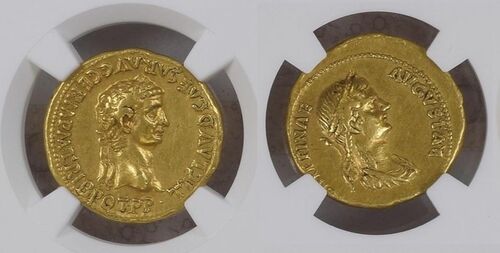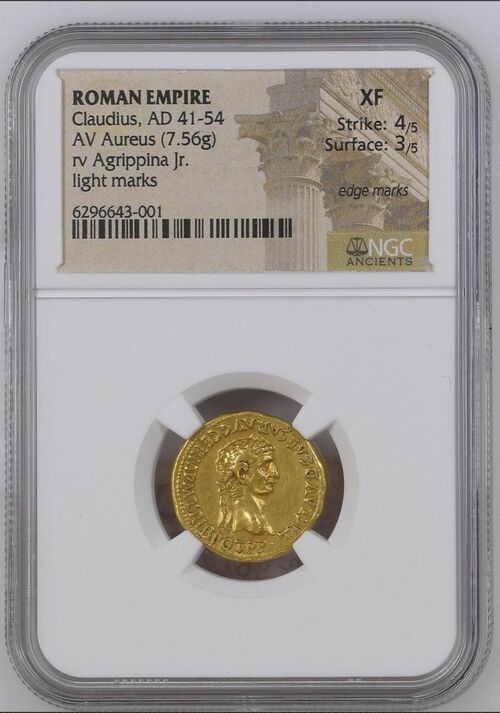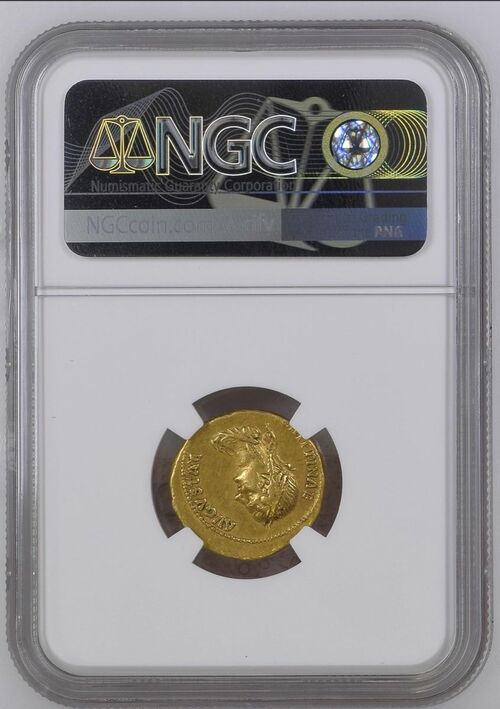Auction: 23007 - Ancient Coins Including the 'Kyrios' Collection of Greek Coins and featuring the 'Ostorius' Collection of Roman Gold
Lot: 188
NGC XF | Roman Empire, Claudius and Agrippina (41-54), AV Aureus, AD 50-54, Rome, TI CLAVD CAESAR AVG GERM P M TRIB POT P P, laureate head right, rev. [AGR]IPPINAE AVGVSTAE, diademed head right, 7.56g [116.8grns], 5h (Cohen 3; BMC 72; RIC I², 80; RCV 1885; Calicó 396e), the reverse a trace off-struck, otherwise lightly toned with deft rim marks, nevertheless a wholesome and pleasing very fine, very rare, especially in this state and with a fine pedigree, in NGC holder, graded XF [Strike 4/5; Surfaces 3/5] (Cert. 6296643-001)
Provenance
H. Osborne O'Hagan, Sotheby's, 13 July 1908, lot 108* - 'very fine and rare'
On New Years Day AD 49, Claudius notoriously married his niece Agrippina. Such a marriage was taboo in the Roman world and caused great controversy at the time. The decision to form this incestuous union, however, was a pragmatic one. Claudius' previous wife, Messalina, had been executed the previous year by the Praetorian guard without trial. It was not uncommon for Imperial women to fall from favour and end up exiled, however, to be executed in such a manner was unprecedented. Messalina had seemingly conspired against Claudius going so far as to marry the senator Gaius Silius while Claudius was out of Rome in Ostia. The immediacy of the political threat necessitated an urgent response culminating in her summary execution by the Praetorians. Claudius would be told of his wife's death over dinner. Purportedly, he did not react and only asked his attendant for another glass of wine.
At this point of crisis, Claudius needed a new wife, someone who could reinforce his imperial legitimacy and blot out the memory of his scandalous previous marriage. The answer was brought to him by one of his trusted freedmen. Agrippina, despite the incest, was the perfect candidate as daughter of Germanicus and granddaughter of Augustus. Claudius himself was had no blood relation to the first emperor, therefore such a marriage could cement his imperial legitimacy and reinforce the Julio-Claudian dynasty. It also had the advantage of preventing her from marrying another man who then might pose a threat to Claudius.
After persuading the senate that the match was in the public interest, Claudius was soon married to his niece. Proclaimed Augusta the following year, Agrippina enjoyed remarkable prominence as empress. Her laureate portrait on the reverse of this coin to match Claudius' on the reverse almost presents her as a kind of joint ruler. Imperial women by this point were commonly featured on coins, however, this laureate portrait attests to a unique prominence. This prominence is well attested by the Roman historians who noted her elevated power. When Caractacus, king of the Catuvellauni was hauled before Claudius as a captive he bowed to both Claudius and Agrippina on the dais. Even a city was named after the Empress - Agrippinensium, modern day Cologne.
Ever unfortunate in marriage, this one too ended in disaster. Agrippina, once she could ensure her own son's succession likely poisoned the elderly emperor's mushrooms. Nero thus became emperor, raised there through his mother's machinations.
Subject to 20% VAT on Buyer’s Premium. For more information please view Terms and Conditions for Buyers.
Estimate
£40,000 to £50,000
Starting price
£40000









